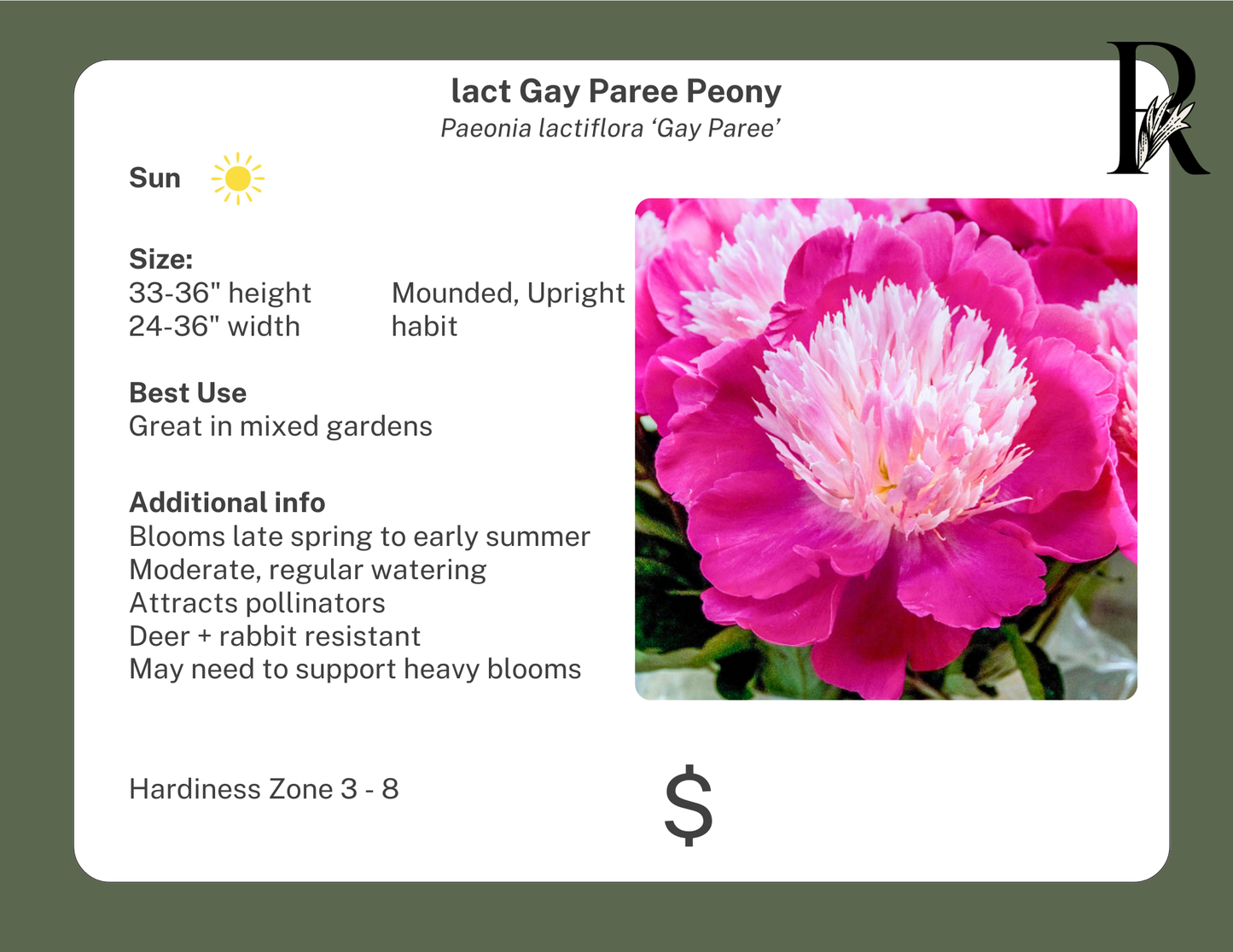Riverdene Garden Centre
Gay Paree Peony
Gay Paree Peony
Couldn't load pickup availability
‘Gay Paree’ (Paeonia lactiflora ‘Gay Paree’) is a Japanese-style herbaceous peony prized for its vivid magenta-pink outer guard petals and a striking creamy white, frilly center of staminodes. This two-toned beauty adds an exotic yet classic look to the garden and makes a fabulous cut flower. It's also long-lived, highly cold-hardy, and relatively low-maintenance — perfect for prairie gardeners.
Key Characteristics
-
Botanical Name: Paeonia lactiflora ‘Gay Paree’
-
Common Name: Gay Paree Peony
-
Plant Type: Herbaceous Perennial
-
Peony Type: Japanese form
-
Hardiness Zones: 3–8
-
Height: 32–36 inches (80–90 cm)
-
Spread: 24–36 inches (60–90 cm)
-
Bloom Time: Mid-season (usually early to mid-June in Zone 3)
-
Flower Color: Bright pink guard petals with a creamy white or pale yellow tufted center
-
Fragrance: Lightly scented — pleasant but not overpowering
-
Foliage: Glossy deep green; attractive through the growing season with good fall color
Sun Requirements
-
Grows best in full sun (6–8 hours/day)
-
Tolerates light shade, though flowering may be reduced
Soil Needs
-
Prefers rich, loamy, well-drained soil
-
Add compost or aged manure before planting
-
Avoid soggy or compacted soil
-
Soil pH: Neutral to slightly alkaline (6.5–7.5)
Watering Needs
-
Moderate moisture during growing and blooming seasons
-
Do not overwater — peonies don’t like “wet feet”
-
Water at the base to avoid fungal diseases
Planting & Spacing
-
Plant in fall (September is ideal for Zone 3) or in early spring from pots
-
Plant roots with buds (eyes) no more than 1–2 inches below the soil surface
-
Too deep = no blooms!
-
-
Spacing: 3 feet apart for airflow and mature size
Maintenance
-
Deadhead after flowering to keep plants tidy
-
Leave foliage intact until it dies back naturally in the fall
-
Cut back stems to the ground after frost
-
Apply mulch in late fall in Zone 3 to protect from freeze-thaw cycles
-
Divide only when necessary (every 10–15 years)
Fertilizing
-
Apply a balanced fertilizer (10-10-10) in early spring
-
Side-dress with compost as buds emerge
-
Avoid high-nitrogen fertilizers, which promote foliage over blooms
Pests & Diseases
-
Generally trouble-free
-
Watch for:
-
Botrytis blight (gray mold): avoid overhead watering and improve air circulation
-
Aphids on early shoots
-
-
Remove and discard fall foliage to prevent disease carryover
Wildlife & Companion Benefits
-
Pollinator-friendly – bees and beneficial insects love it
-
Ants are often seen on buds — harmless
-
Deer and rabbit resistant
-
Companion plants:
-
Catmint (Nepeta)
-
Allium
-
Iris
-
Salvia
-
Ornamental grasses
-
Garden Uses
-
Perennial borders
-
Cottage gardens
-
Cut flower beds
-
Standalone focal plant
-
Memorial or legacy gardens (peonies live for generations)
Special Notes
-
‘Gay Paree’ has been a favorite for decades due to its unique bicolor blooms and excellent stem strength
-
Makes a wonderful cut flower — long-lasting and eye-catching in bouquets
-
Can live 50+ years with little care once established
Share


